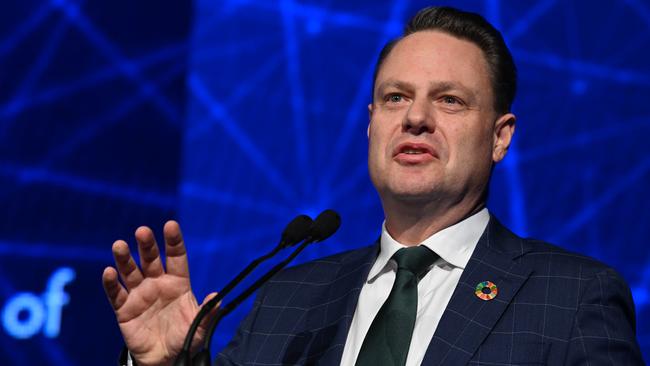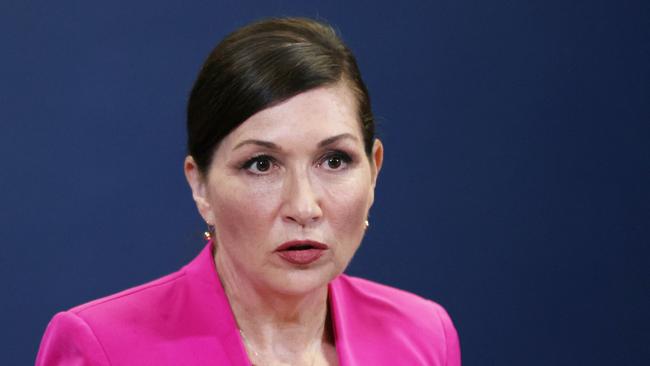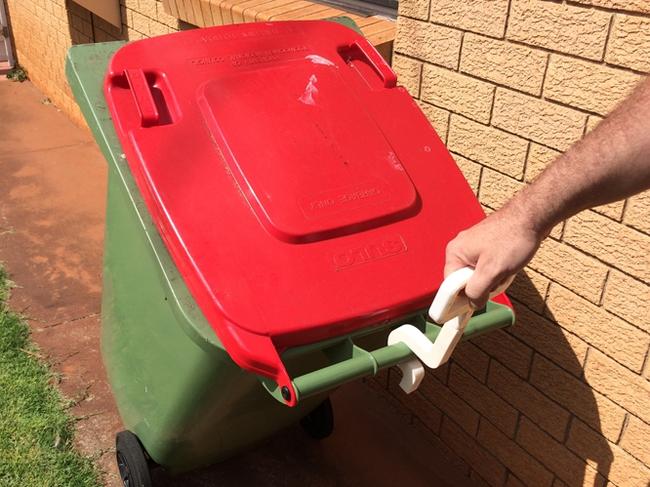Brisbane City Council launches war on waste with $200 rebates to combat state government ‘bin tax’
Brisbane City Council has launched a landmark overhaul of its waste strategy, offering residents a chance to claim a $200 rebate to combat the state government’s “bin tax”.
QLD News
Don't miss out on the headlines from QLD News. Followed categories will be added to My News.
Brisbane residents are set to pocket a $200 rebate when their household installs insinkerators and waste dehydrators from January under a landmark overhaul of the council’s waste strategy in a bid to curb pressure from the spiralling cost of the state government’s “bin tax”.
Lord Mayor Adrian Schrinner said the Brisbane City Council would undertake sweeping measures to attempt to cut landfill and save rate payers from the extra cost, including digitising waste vouchers, increased rebates, 1500 new recycling bins in parks and a rollout of a food waste recycling service.
A phased roll back of state government payments to councils to offset the levy combined with annual increases and rising amount of waste would cost the city about $338 million – or about $600 per household – over the next decade, the council’s Towards Zero Waste strategy estimated.

“Every Brisbane household will pay the state’s bin tax if we don’t take action,” Mr Schrinner said.
“The state government promised residents its waste levy wouldn’t effectively be bin tax but unfortunately that’s not going to be the case.
“Our strategy will help residents recycle, reduce the volume of waste that ends up in landfill and, importantly, minimise the impact of the State’s bin tax.”
The state government introduced a $70 per tonne waste levy in 2019 in a bid to reduce landfill and boost recycling, with then Environment Minister Leeanne Enoch pledging it would not directly impact Queensland households.
“We are sticking by our commitment that ratepayers will not have to pay more to put out their wheelie bins or take a load of rubbish to the tip because of the waste levy,” she said at the time.
“We are providing $143 million in advance payments to councils to ensure the don’t have to pass on the cost to ratepayers.”
This year the levy has risen to $105 per tonne, and would grow to $145 per tonne by 2027-28.

Mr Schrinner said the strategy also included a new $200 rebate for households that install insinkerators and waste dehydrators next year, the creation of 50 community-based recycling hubs over five years for items such as batteries, CDs, glasses and tablet blister packs and the introduction of bottle and can donation bins for event organisers with funds going to charity.
But the Lord Mayor was adamant residents would not lose their weekly “red-top” bin collection service – a step other councils around Australia had introduced to curb landfill.
“Our commitment is simple,” he said. “We will keep weekly red-top collections. We will not cut them to fortnightly.
“We’ve seen what’s happened when much smaller councils have rushed food waste recycling, cut red-top collections and caused a big stink with their residents.
“Just recently there were reports of Sydney families being forced to freeze dirty nappies to avoid them festering for a fortnight in red-top bins.”

He said it was why attempting to “switch on food waste recycling overnight” across more than 500,000 in the council area would not work.
“It would create a massive stinking pile of contaminated waste that cannot be safely made into compost,” he said.
“It would leave our suburbs filled with foul-smelling red-top bins for a fortnight, particularly during the warmer months.
“We’re going to maintain weekly red-top collections and progressively rollout a food waste recycling service in a responsible way.”
WHAT YOU GET
Under the Towards Zero Waste strategy, Council will:
■ Offer a new $200 rebate for households that install insinkerators and waste dehydrators from January 1 2024.
■ Increase the rebate for compost bins and worm farms from $70 to $100 from January 1 2024.
■ Investigate more locations for advanced community compost hubs to service apartments. (ie similar to New Farm).
■ Create 50 convenient community-based recycling hubs over five years for items such as batteries, CDs, glasses and tablet blister packs.
■ Install 1,500 new park recycling bins across Brisbane.
■ Work with industry to establish a household soft plastics recycling trial.
■ Digitise waste vouchers.
■ Expand Brisbane’s food waste recycling service to 12,000 households from 1 February 2024.
■ Staged roll out of a citywide household food waste recycling service over the next four years.
■ Investigate incentivising anaerobic digestion and other technologies in apartment buildings.
■ Install three smart bottle and can donation station machines in Mall Precincts.
■ Introduce bottle and can donation bins for event organisers with funds going to the Lord Mayor’s Charitable Trust and grassroots charities.
■ Keep Brisbane’s red-top waste collection as a weekly service.
BRISBANE WASTE – FAST FACTS
■ 600,472 wheelie bin collections occur each week on average in Brisbane
■ 12,363 residents are registered users of Brisbane’s Community Compost Hubs
■ 65 per cent of the waste in the average Brisbane red-top bin is made up of resources that can be recycled (food, garden, recyclables)
■ 66,787 tonnes of material recycled from yellow-top bins in 2022-23
■ 95,000 tonnes of garden waste is collected each year through green-waste recycling bins and self-haul
■ 1,111,549 trips were made to Brisbane’s resource recovery centres in 2022-23
■ 50,000 people visited and 450 tonnes of good donated to Council’s Treasurer Troves in 2022-23
■ 948 tonnes of e-waste was collected at Council’s resource recovery centres
■ 43,654 downloads of the Brisbane Bin and Recycling App in 2022-23
■ 60,383 tonnes of reclaimed asphalt was recycled and reused
■ 1,031,914 waste vouchers used in 2022-23
■ 144,953 green bins in circulation




